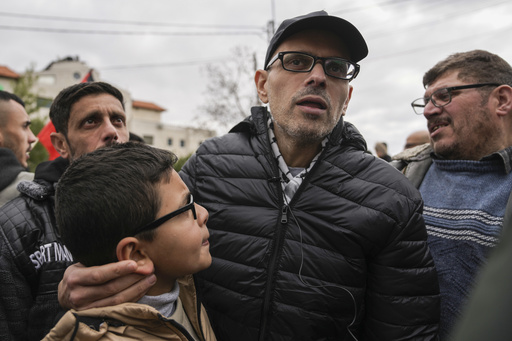On Saturday, Israel liberated 183 Palestinian prisoners as part of a negotiation linked to Israeli hostages taken in Gaza. This exchange coincides with a ceasefire aimed at halting ongoing hostilities, though the long-term sustainability of this truce remains in question.
While Israel categorizes these detainees as terrorists, Palestinians view them as activists fighting against what they perceive as a prolonged military occupation. Many Palestinians have personal connections to incarceration, with friends or family members having faced arrest for various reasons ranging from militant activities to less severe infractions like protesting, rock-throwing, or affiliations with prohibited political organizations. Numerous individuals are kept in administrative detention for extended periods without fair trials, a practice Israel defends as necessary for maintaining security and protecting classified information.
Among those released on Saturday, 18 individuals had been sentenced to life in prison, and 54 were serving lengthy sentences due to their roles in attacks resulting in Israeli casualties. Some of these individuals had spent almost two decades in prison. In the West Bank’s Beitunia, the returnees were met with enthusiastic crowds waving flags and chanting slogans in support of Hamas.
As the released prisoners stepped off the bus, several fell to their knees, kissing the pavement and shedding tears of joy upon reuniting with tearful family members before they returned home across the West Bank.
Samah Abu Aliya expressed the anguish of waiting for her son, Imad, who was freed after serving four and a half years for a conviction of intentional manslaughter and anti-Israel incitement. Israel labels him a member of Hamas, which adds a layer of complexity to his release.
Seven of the prisoners with the most serious convictions were transferred to Egypt. Under the truce terms, they will either remain in Egypt or be deported to another nation.
Additionally, the release included 111 Palestinians arrested following Hamas’s surprise assault on Israel on October 7, 2023. These individuals had been detained without trial and were welcomed enthusiastically in Gaza’s Khan Younis as they entered the European Hospital.
Notable individuals among those released since the truce began on January 19 include:
Iyad Abu Shakhdam, 49 – He faced 18 life sentences for his involvement in deadly Hamas attacks during the second intifada. He participated in a notable double suicide bombing in 2004 that resulted in the deaths of 16 Israelis. Throughout his two-decade incarceration, his family shared that he completed high school and pursued further education in psychology. Upon his release, he expressed confidence in eventual freedom despite the suffering he experienced over the years.
Jamal al-Tawil, 61 – A prominent Hamas figure, al-Tawil has frequently cycled in and out of Israeli prisons over the years, primarily due to allegations of plotting suicide bombings. He was detained without charges since 2021. His daughter was previously released during earlier exchanges, and upon his release, al-Tawil required immediate medical attention due to his weakened state from a prolonged hunger strike protesting his detention.
Mohammed el-Halabi, 47 – El-Halabi, who managed World Vision’s Gaza operations, was arrested in 2016 on allegations of diverting funds to Hamas. These accusations were vigorously denied by him and his organization. He maintained that he had followed strict operational protocols, and independent investigations failed to substantiate the claims against him. His legal proceedings drew criticism for lack of transparency and fairness.
Shadi Amouri, 44 – Accused of crafting a significant car bomb for an attack that killed multiple Israelis in 2002, Amouri received a life sentence along with additional time. He was among those transferred to Egypt following the recent exchanges.
Zakaria Zubeidi – A notable former militant leader, Zubeidi gained attention for his 2021 escape attempt from an Israeli prison, which captivated many. He co-founded a theater in Jenin that symbolizes cultural resistance. Although he has faced numerous legal challenges, he shifted his focus towards activism after the second intifada.
Mohammed Abu Warda – Involved in organizing deadly attacks during the second intifada, Abu Warda received a hefty sentence of 48 life terms. He was granted release and subsequently deported to an undisclosed location.
Mohammed Aradeh, 42 – Associated with Palestinian Islamic Jihad, Aradeh was sentenced to life for various offenses dating back to the second intifada. Notably, he played a pivotal role in a significant prison escape in 2021.
Wissam Abbasi, Wael Qassim, and Mohammed Odeh – All from Silwan in East Jerusalem, these men were implicated in numerous fatal attacks and handed multiple life sentences before being transferred out of the country.
Mohammad al-Tous, 67 – Renowned for being the longest-held prisoner in Israel, al-Tous served a staggering 39 years, having been first arrested in 1985. He was part of the group exiled on January 25.
This exchange of prisoners has stirred significant emotions and responses on both sides, illuminating the complexities of the Israeli-Palestinian conflict and the deep-seated feelings surrounding issues of imprisonment, resistance, and calls for justice.



